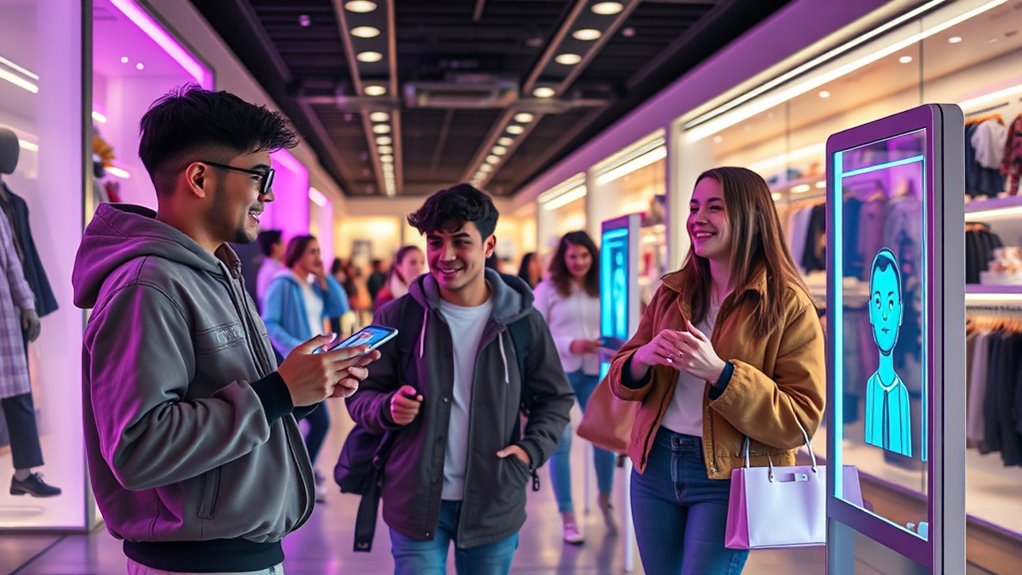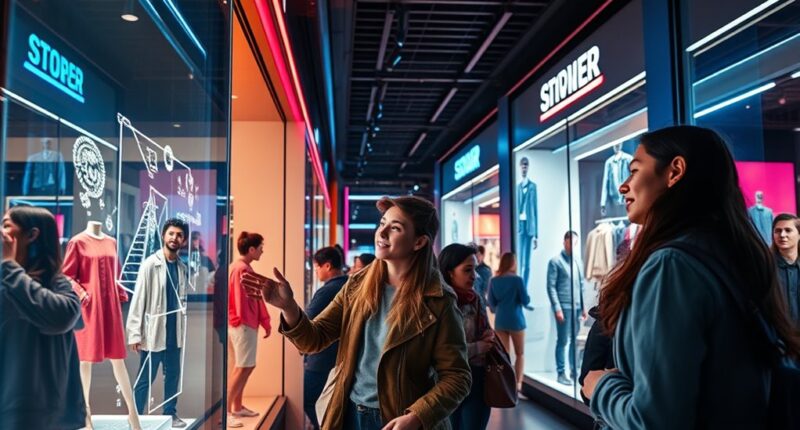AI now plays a central role in how you shop, especially if you’re part of Gen Z or Millennials. It personalizes your experience by analyzing your preferences, browsing habits, and past purchases. AI-powered chatbots, visual searches, and smart recommendations make shopping faster, more fun, and tailored to you. Retailers are using these innovations to meet your desire for instant, relevant experiences. Keep exploring, and you’ll discover how these tech trends continue transforming your shopping journey.

As AI continues to revolutionize retail, Gen Z and Millennials are experiencing shopping that’s more personalized, seamless, and engaging than ever before. You no longer have to sift through endless options or guess which products suit your style. Instead, AI-driven tools analyze your preferences, browsing habits, and purchase history to craft tailored recommendations that feel intuitive and relevant. When you visit a retail website, chatbots and virtual assistants are ready to assist you in real-time, answering questions, offering suggestions, and helping you find exactly what you need without delay. During major shopping events like Cyber Monday, AI-related chat interactions spike dramatically, showing how integral these technologies have become in shaping your online experience.
AI makes shopping more personalized, seamless, and engaging for Gen Z and Millennials, transforming online experiences during major sales events.
Retailers expect AI capabilities to become even more personalized within a year, fueling a shopping journey that adapts to your unique tastes instantly. This hyper-personalization isn’t just about recommending products; it’s about creating a seamless experience across all channels. Whether you’re shopping online or in-store, AI-powered visual search tools make discovering products easier—especially in fashion and electronics—by letting you upload images or use your camera to find similar items effortlessly. These innovations make browsing more engaging and faster, aligning perfectly with your desire for instant gratification and customization. Additionally, air purifiers that utilize advanced technology can enhance your home environment, contributing to a healthier lifestyle.
AI isn’t just transforming the shopping experience; it’s also improving operational efficiency for retailers, which benefits you. Demand forecasting and inventory management are becoming smarter, reducing stockouts and ensuring the products you want are available when you want them. Automated product listing speeds up the process of getting new items online, meaning you see fresh, accurate listings faster. Fraud detection and transaction security are enhanced, giving you confidence when making purchases. Retailers are also leveraging AI to optimize their offerings, ensuring that the right products are available at the right time, based on real-time data and customer trends. This focus on efficiency helps retailers respond quickly to changing consumer demands and keeps your shopping experience smooth and reliable.
In e-commerce, AI plays a vital role in increasing conversion rates by optimizing site speed and providing personalized recommendations, often increasing your average order size. Many online retailers, including giants like Amazon, use AI to power smart shopping assistants that help you browse, compare, and purchase with ease. Visual and video content generation tools enable brands to produce engaging marketing materials at scale, making shopping more visually appealing and interactive. Generative AI further accelerates product ideation, content creation, and catalog updates, helping retailers innovate faster and offer more compelling shopping experiences.
You, as a younger consumer, demand these innovations. AI-driven personalization and seamless experiences are now standard, shaping your expectations and preferences. Retailers who harness AI understand this and are actively designing smarter, more engaging ways for you to shop—making your experience not just easier but more fun and tailored to your individual style.
Frequently Asked Questions
How Do AI Trends Influence Gen Z and Millennials’ Brand Loyalty?
AI trends influence your brand loyalty by making experiences more personalized and seamless. When brands use AI to deliver tailored recommendations and efficient support, you feel more connected and trusting. This increases your emotional attachment and ethical loyalty, especially when brands align AI practices with your values. However, your loyalty can still shift quickly if brands don’t keep up with innovation or fail to provide meaningful value through AI-driven engagement.
What Ethical Concerns Arise From AI Personalization in Retail?
You should be aware that 60% of consumers avoid AI recommendations due to perceived biases or stereotypes, highlighting ethical concerns. AI personalization raises issues like privacy breaches, data misuse, and algorithmic biases that can reinforce discrimination. You need to guarantee transparency, fairness, and accountability in AI systems, actively monitoring for biases. Ethical AI practices protect consumer trust, promote inclusivity, and prevent perpetuating social inequalities in retail experiences.
How Does AI Impact the Shopping Experience During Peak Seasons?
During peak seasons, AI dramatically enhances your shopping experience by delivering personalized recommendations, streamlining checkout with chatbots, and ensuring product availability through inventory optimization. It helps retailers anticipate demand, adjust prices dynamically, and manage logistics efficiently. As a result, you enjoy faster, more tailored interactions, less frustration, and better service. This seamless experience encourages you to spend more, browse longer, and return, making peak shopping periods more convenient and enjoyable.
Are There Privacy Risks Associated With Ai-Driven Retail Data Collection?
Yes, there are privacy risks with AI-driven retail data collection. You might worry about your personal information being exposed or misused, especially since many consumers feel AI companies use data in unintended ways. Retailers using AI must implement strict safeguards like transparency, consent, and data anonymization to protect your privacy. Failing to do so could lead to data breaches, regulatory penalties, and a loss of consumer trust.
What Future AI Innovations Could Further Change Retail for Young Consumers?
Think of AI as a crystal ball, revealing future retail trends for you. Upcoming innovations like augmented reality try-ons, hyper-personalized virtual stores, and seamless voice shopping will make browsing more immersive and tailored. Smart AI will predict your needs even before you realize them, creating a frictionless experience. These advances promise to make shopping more engaging, convenient, and aligned with your individual style, transforming how you connect with brands daily.
Conclusion
As AI becomes the heartbeat of retail for your generation, it paints a vibrant tapestry where your preferences light up the digital sky. Imagine a world where every shopping experience feels like a tailored constellation, guiding you effortlessly to what you desire. Embrace this future, where technology and your unique style intertwine, transforming retail into a personalized journey. The horizon is bright, and AI’s role is only just beginning to illuminate your world.









